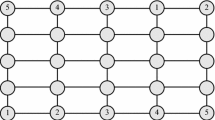Abstract
This paper studies the two-agent vehicle scheduling problems on a line with the constraint that each job is processed after its release time. All jobs belong to agent A or agent B and each job is located at some vertex on the line. The vehicle starts from an initial vertex \(v_{0}\) to process all jobs. The objective of the problem is to find a route of the vehicle so as to minimize the makespan of agent A under the constraint condition that the makespan of agent B is no more than the threshold value Q. This problem can be expressed by the 3-field scheduling notations as \(line-1|r(v_{j}),~C_{max}^{B}\le Q|C_{max}^{A}\). For the problem without release time, we show this problem is solvable in polynomial time and an O(n) time algorithm is provided. For the problem with release time, we prove this problem is NP-hard and then, a \(\frac{3+\sqrt{5}}{2}\)-approximation algorithm is presented. Finally, we conclude the numerical experiments to evaluate the performance of the approximation algorithm.


Similar content being viewed by others
Data availibility
The data in our numerical experiments are randomly generated by the uniform probability distribution.
References
Agnetis A, Mirchandani PB, Pacciarelli D, Pacifici A (2004) Scheduling problems with two competing agents. Oper Res 52(2):229–242
Agnetis A, Pacciarelli D, Pacifici A (2007) Multi-agent single machine scheduling. Ann Oper Res 150(1):3–15
Agnetis A, de Pascale G, Pacciarelli D (2009) A Lagrangian approach to single-machine scheduling problems with two competing agents. J Sched 12(4):401–415
Augustine JE, Seiden S (2004) Linear time approximation schemes for vehicle scheduling problems. IFIP Adv Inf Commun Technol 324(2–3):147–160
Baker KR, Smith JC (2003) A multiple-criterion model for machine scheduling. J Sched 6(1):7–16
Bao XG, Liu ZH (2012) Approximation algorithms for single vehicle scheduling problems with release and service times on a tree or cycle. IFIP Adv Inf Commun Technol 434:1–10
Gaur DR, Gupta A, Krishnamurti R (2003) A \(\frac{5}{3}\)-approximation algorithm for scheduling vehicles on a path with release and handling times. Inf Process Lett 86(2):87–91
Karuno Y, Nagamochi H, Ibaraki T (1998) A 1.5-approximation for single-vehicle scheduling problem on a line with release and handling times. In: Japan-USA Symposium on Flexible Automation, Ohtsu, Japan, pp 1363–1366
Lee K, Choi BC, Leung JYT, Pinedo ML (2009) Approximation algorithms for multi-agent scheduling to minimize total weighted completion time. Inf Process Lett 109(16):913–917
Leung JYT, Pinedo M, Wan GH (2010) Competitive two-agent scheduling and its applications. Oper Res 58(2):458–469
Nagamochi H, Mochizuki K, Ibaraki T (1997) Complexity of the single vehicle scheduling problem on graphs. Inf Syst Oper Res 35(4):256–276
Psaraftis HN, Solomon MM, Magnanti TL, Kim TU (1990) Routing and scheduling on a shoreline with release times. Manag Sci 36(2):212–223
Tsitsiklis JN (1992) Special cases of traveling salesman and repairman problems with time windows. Networks 22(3):263–282
Wang JQ, Fan GQ, Zhang Y, Zhang CW, Leung JYT (2017) Two-agent scheduling on a single parallel-batching machine with equal processing time and non-identical job sizes. Eur J Oper Res 258(2):478–490
Yang LY, Lu XW (2017) Two-agent supply chain scheduling problem to minimize the sum of the total weighted completion time and batch cost. J Oper Res Soc China 5:257–269
Yu W, Liu Z (2011) Single-vehicle scheduling problems with release and service times on a line. Networks 57(2):128–134
Zhao KJ, Lu XW (2013) Approximation schemes for two-agent scheduling on parallel machines. IFIP Adv Inf Commun Technol 468:114–121
Funding
This research was supported by the National Natural Science Foundation of China under Grant 11871213.
Author information
Authors and Affiliations
Corresponding author
Ethics declarations
Conflict of interest
The authors declare that they have no relevant financial or non-financial interests.
Additional information
Publisher's Note
Springer Nature remains neutral with regard to jurisdictional claims in published maps and institutional affiliations.
A preliminary result of this work has been published in the 15th Annual International Conference on Combinatorial Optimization and Applications (2021).
Appendix
Appendix
For the case that the right end vertex is belonging to agent A, the following algorithm is designed for \(line-1|r(v_{j})=0,~C_{max}^{B}\le Q|C_{max}^{A}\). Define \(M=\{v_{1}^{A},...,v_{j}^{A}\}\) be the vertex set of agent A located before \(v_{n_{B}}^{B}\) on the line.

We can also prove that this algorithm is an O(n) time algorithm in a similar way to Theorem 3.1 except for using below value ranges of Q. (1) \(2L^{A}-d(v_{0},v_{1}^{B})+H\le Q\); (2)\(L^{A}+d(v_{n_{A}}^{A},v_{n_{B}}^{B})+H\le Q< 2L^{A}-d(v_{0},v_{1}^{B})+H\); (3) \(L^{B}+P^{B}\le Q< L^{A}+d(v_{n_{A}}^{A},v_{n_{B}}^{B})+H\); (4) \(Q< L^{B}+P^{B}\). So we have shown that the problem \(line-1|r(v_{j})=0,~C_{max}^{B}\le Q|C_{max}^{A}\) is polynomially solvable.
Rights and permissions
Springer Nature or its licensor (e.g. a society or other partner) holds exclusive rights to this article under a publishing agreement with the author(s) or other rightsholder(s); author self-archiving of the accepted manuscript version of this article is solely governed by the terms of such publishing agreement and applicable law.
About this article
Cite this article
Yan, H., Liu, P. & Lu, X. Vehicle scheduling problems with two agents on a line. J Comb Optim 45, 10 (2023). https://doi.org/10.1007/s10878-022-00933-3
Accepted:
Published:
DOI: https://doi.org/10.1007/s10878-022-00933-3




